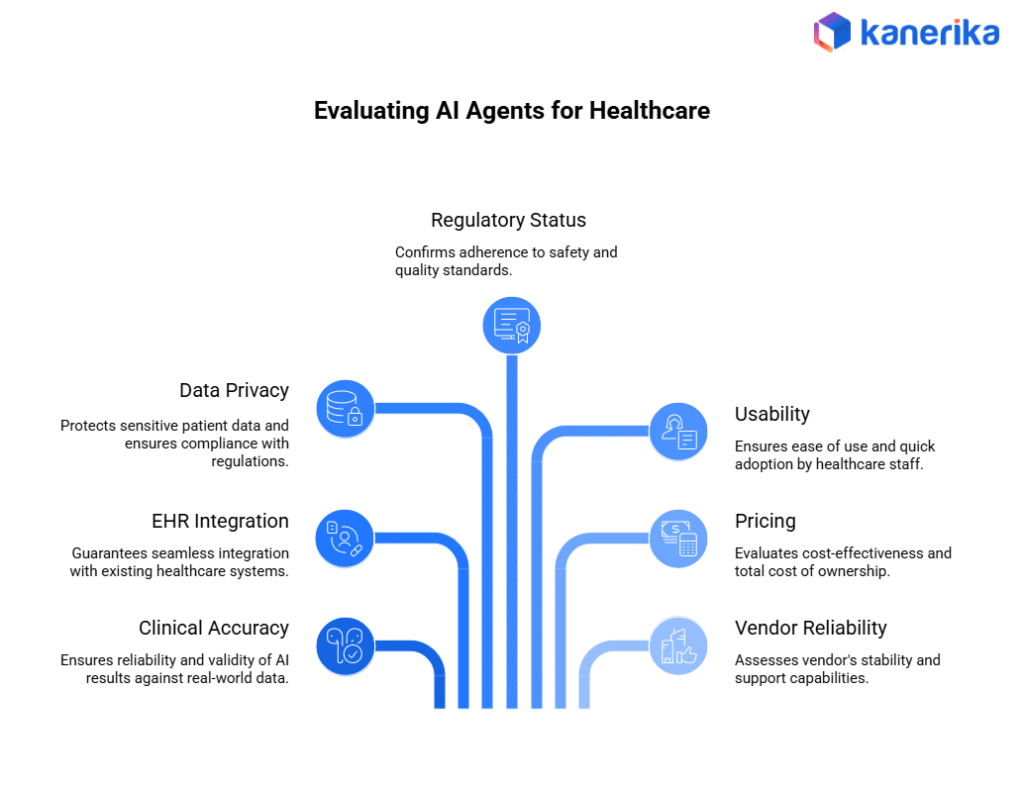Healthcare organizations lose $150 billion annually to administrative inefficiencies, yet AtlantiCare just flipped that script. Their providers now save 66 minutes every single day through healthcare AI agents handling documentation tasks. That’s over five hours weekly that doctors can spend with patients instead of paperwork.
AI agents for healthcare represent software systems that work autonomously to complete clinical and administrative tasks. Unlike basic chatbots that need constant human input, these digital assistants analyze medical data, make informed decisions, and execute complex workflows independently. They’re transforming how hospitals operate, from automating patient intake to supporting diagnostic decisions.
But here’s what matters most. Finding the right AI agent for healthcare means understanding which AI clinical tools actually deliver results versus those making empty promises about revolutionizing medicine.
Enhance Enterprise Productivity and Efficiency with Custom AI Agents
Partner with Kanerika Today.
7 Ways AI Agents Can Elevate and Modernize Healthcare Operations
1. Automated Clinical Documentation
Healthcare AI agents act as virtual medical scribes, capturing patient conversations and creating structured clinical notes without manual typing. These autonomous systems understand medical terminology, context, and can differentiate between relevant clinical information and casual conversation. Providers using AI documentation agents report saving up to 2 hours daily on charting tasks.
- Transcribes patient encounters in real-time and generates SOAP notes automatically
- Updates electronic health records directly without additional data entry steps
- Reduces documentation errors by 40% through consistent formatting and terminology
2. Intelligent Patient Scheduling and Flow Management
AI agents for healthcare scheduling analyze multiple data points including appointment history, procedure requirements, and resource availability to optimize daily schedules. These systems predict no-shows with 85% accuracy and automatically fill cancelled slots. The result is better capacity utilization and reduced patient wait times.
- Manages complex scheduling scenarios across multiple departments and providers
- Sends automated reminders and handles rescheduling requests through natural conversation
- Increases appointment adherence by 30% through personalized follow-up communications
3. Diagnostic Support and Clinical Decision Making
Medical AI assistants analyze patient data, lab results, and imaging studies to provide evidence-based diagnostic suggestions. These healthcare automation tools don’t replace physician judgment but offer additional insights that might be overlooked. IBM Watson’s AI agent identified rare leukemia cases that human doctors initially missed, matching expert conclusions 99% of the time.
- Compares symptoms against vast medical databases for differential diagnosis support
- Flags potential drug interactions and contraindications before prescriptions are filled
- Provides real-time clinical guidelines and treatment protocols during patient consultations
4. Revenue Cycle and Claims Management
Administrative AI agents handle prior authorizations, verify insurance eligibility, and process claims submissions autonomously. These digital healthcare assistants reduce claim denials by catching errors before submission. Healthcare organizations report recovering millions in previously lost revenue through AI-powered coding accuracy improvements.
- Automatically codes medical procedures using natural language processing of clinical notes
- Appeals denied claims with supporting documentation pulled from patient records
- Tracks reimbursement patterns and identifies underpayment issues across payers
5. 24/7 Patient Engagement and Support
Virtual health assistants provide round-the-clock patient support, answering medical questions and triaging symptoms without human intervention. These AI healthcare chatbots handle routine inquiries, freeing staff for complex cases. Studies show patients prefer immediate AI responses over waiting for human callbacks for non-urgent matters.
- Conducts symptom assessments and recommends appropriate care levels
- Manages medication reminders and tracks adherence through conversational check-ins
- Provides mental health support between therapy sessions using evidence-based techniques
6. Predictive Analytics for Preventive Care
Healthcare AI agents continuously monitor patient data to identify early warning signs of deterioration or disease progression. These predictive systems analyze patterns across thousands of variables that humans couldn’t process manually. Hospitals using AI agents for patient monitoring report 20% reduction in readmission rates.
- Identifies high-risk patients for targeted intervention programs before complications arise
- Predicts sepsis onset up to 6 hours earlier than traditional monitoring methods
- Alerts care teams about patients likely to miss appointments or discontinue treatment
7. Workflow Optimization and Resource Allocation
AI agents in healthcare analyze operational data to identify bottlenecks and suggest process improvements. These intelligent systems coordinate between departments, managing bed assignments, staff scheduling, and equipment allocation. The result is smoother operations and better resource utilization across the entire facility.
- Predicts emergency department volumes and adjusts staffing recommendations accordingly
- Manages surgical suite turnover by coordinating cleaning, setup, and patient preparation
- Optimizes supply chain by predicting usage patterns and preventing stockouts
AI Agent Examples: From Simple Chatbots to Complex Autonomous Systems
Explore the evolution of AI agents, from simple chatbots to complex autonomous systems, and their growing impact.
Top 10 AI Agents for Healthcare
A. Clinical Documentation & Virtual Scribes
1. Innovaccer Provider Copilot
Provider Copilot serves over 96,000 healthcare providers across six of the top ten U.S. health systems, automating clinical documentation and administrative tasks. This healthcare AI agent integrates seamlessly with existing EHR systems, reducing documentation time while improving care quality metrics.
- Creates clinical notes automatically from doctor-patient conversations without manual input
- Performs real-time diagnosis assistance based on patient data and medical history
- Identifies coding gaps and quality measure opportunities for value-based care programs
- Generates patient summaries before appointments for quick clinical review
- Integrates with major EHR platforms including Epic and Cerner for workflow continuity
Pricing: Custom enterprise pricing based on provider count and modules selected. Contact sales for quotes.
2. AWS HealthScribe
AWS HealthScribe leverages Amazon’s cloud infrastructure to transform patient-clinician conversations into structured medical documentation. Healthcare organizations benefit from enterprise-grade security and scalability while reducing documentation burden on clinical staff.
- Transcribes medical conversations with specialized healthcare vocabulary recognition
- Extracts key clinical information including symptoms, medications, and treatment plans
- Generates draft clinical notes that providers can review and approve quickly
- Supports multiple medical specialties with customized documentation templates
- Maintains HIPAA compliance with encrypted data processing and storage
Pricing: Pay-as-you-go model at $0.0984 per minute of audio transcribed. No upfront costs or minimum fees required.
B. Patient Engagement & Support
3. Hippocratic AI
Hippocratic AI focuses on addressing healthcare staffing shortages through autonomous patient-facing AI agents that handle administrative and clinical support tasks. The platform emphasizes safety and accuracy in patient interactions while reducing operational costs for healthcare facilities.
- Completes patient intake forms and insurance verification processes autonomously
- Manages complex appointment scheduling including multi-provider coordination
- Conducts pre-visit planning and post-discharge follow-up calls
- Handles medication adherence reminders and refill requests
- Provides chronic disease management support between clinical visits
Pricing: Enterprise pricing model requiring demo consultation. No public pricing available.
4. Ada Health
Ada Health’s AI medical assistant helps patients understand their symptoms and navigate appropriate care pathways through intelligent symptom assessment. The platform serves both individual users and healthcare organizations looking to improve patient triage and care access.
- Performs personalized health assessments using AI-powered symptom checking
- Directs patients to appropriate care settings based on symptom severity
- Supports multiple languages for diverse patient populations
- Integrates with telehealth platforms for seamless virtual care transitions
- Tracks symptom progression over time for chronic condition monitoring
Pricing: Free for individual users through mobile app. Enterprise solutions require custom quotes based on patient volume and integration needs.
Agentic Automation: The Future Of AI-Driven Business Efficiency
Explore how agentic automation is driving next-level business efficiency by enabling AI systems to act, decide, and execute with minimal human effort.
C. Clinical Decision Support
5. IBM Watson Health
IBM Watson Health applies advanced AI to analyze vast amounts of medical data, supporting clinical decision-making with evidence-based insights. The platform has showed 99% accuracy in matching expert medical conclusions for complex cases including rare disease identification.
- Analyzes genetic data for personalized cancer treatment recommendations
- Reviews medical literature to suggest evidence-based treatment options
- Identifies potential clinical trial matches for eligible patients
- Predicts patient risk factors using machine learning algorithms
- Supports drug discovery by analyzing molecular structures and interactions
Pricing: Custom enterprise pricing based on specific modules and user count. Typical implementations range from $100,000 to several million annually.
6. Sully.ai
Sully.ai provides an all-in-one virtual assistant specifically designed for healthcare environments, supporting clinical, administrative, and pharmacy operations. The AI healthcare agent handles multiple roles simultaneously, from nursing support to medical coding automation.
- Functions as real-time medical scribe during patient encounters
- Automates medical coding with high accuracy for billing optimization
- Assists nurses with patient monitoring and vital sign documentation
- Manages pharmacy operations including prescription preparation and verification
- Handles front-desk tasks like appointment scheduling and patient communications
Pricing: Subscription-based model with custom quotes. Pricing varies by practice size and features selected.
D. Administrative & Operational AI
7. Notable AI
Notable AI streamlines healthcare operations through intelligent automation of administrative workflows using their low-code platform. Healthcare providers can customize AI agents to handle specific operational challenges without extensive technical expertise.
- Automates patient intake and registration processes across channels
- Manages referral coordination between primary and specialty care
- Identifies and closes care gaps for quality measure compliance
- Monitors real-time performance metrics through customizable dashboards
- Integrates with existing EHR and CRM systems for data synchronization
Pricing: Platform pricing starts at approximately $20,000 annually for small practices. Enterprise pricing requires consultation.
8. Amelia AI
Amelia’s conversational AI agents handle high-volume employee and patient inquiries, achieving 97% resolution rates without human intervention. The platform scales across enterprise healthcare organizations, managing over 560 daily conversations for clients like Aveanna Healthcare.
- Processes password resets and user authentication requests automatically
- Answers employee HR questions about benefits and policies
- Handles patient billing inquiries and payment processing
- Provides IT support for clinical applications and systems
- Integrates with Epic, Cerner, and other major healthcare platforms
Pricing: Enterprise-only pricing starting around $100,000 annually. Final costs depend on conversation volume and integration complexity.
Take Your Business to New Heights with Powerful AI Agents!!
Partner with Kanerika Today.
E. Specialized Healthcare Agents
9. Mental Health AI Agents
Mental health support platforms use AI agents to provide continuous therapeutic support between clinical sessions. These digital mental health assistants help manage depression and anxiety through evidence-based interventions, making mental healthcare more accessible.
- Delivers cognitive behavioral therapy techniques through conversational interfaces
- Monitors mood patterns and triggers through daily check-ins
- Provides crisis intervention support with escalation protocols
- Tracks medication adherence for psychiatric prescriptions
- Offers 24/7 availability for patients in underserved areas
Pricing: Varies by platform. Consumer apps range from $10-30 monthly. Enterprise mental health solutions typically cost $3-8 per employee per month.
10. Diagnostic AI Agents
Diagnostic AI agents analyze medical imaging and laboratory data with accuracy rates exceeding human specialists in certain areas. These healthcare automation tools achieve 94% accuracy in detecting lung nodules compared to 65% for traditional radiologist reviews.
- Screens mammograms for breast cancer with 90% sensitivity rates
- Identifies diabetic retinopathy in eye scans for early intervention
- Analyzes pathology slides for cancer cell detection
- Processes ECG readings for cardiac abnormality identification
- Prioritizes urgent cases for immediate radiologist review
Pricing: Typically priced per scan or study analyzed, ranging from $5-50 depending on complexity. Volume-based discounts available for large healthcare systems.
Agentic AI vs Generative AI: Everything You Need to Know
Uncover the key differences between Agentic AI and Generative AI, and learn how each can transform your business operations.
How to Evaluate AI Agents for Healthcare
1. Clinical Accuracy and Validation
The first test for any AI agent in healthcare is whether it delivers reliable results. Tools that assist in diagnosis, imaging, or note-taking must be validated against real-world clinical data and peer-reviewed studies.
- Check if the vendor shares validation metrics such as sensitivity and specificity
- Look for published trials or third-party audits
- Compare accuracy across different patient populations
2. EHR Integration and Workflow Fit
An AI agent is only useful if it works inside the systems doctors already use. Smooth integration with EHR platforms like Epic or Cerner ensures the agent fits into daily routines without adding extra clicks.
- Confirm support for standards like HL7 and FHIR
- Ask how data is synced into patient records
- Test if the agent runs in real-time during visits
3. Data Privacy and Security
Handling sensitive health data means compliance with HIPAA and GDPR. AI agents must show how they secure data from collection to storage without exposing patient details.
- Check for HIPAA certification and security audits
- Review encryption and access control methods
- Ask about data residency and vendor liability

4. Regulatory Status and Oversight
Not all AI agents are medical devices, but those that make clinical suggestions may need FDA clearance or similar approvals. This status shows the vendor has met safety and quality standards.
- Verify if the agent is FDA cleared or CE marked
- Understand whether it is classified as Software as a Medical Device (SaMD)
- Ask how updates are monitored for compliance
5. Usability and Adoption
Even the most advanced AI copilot for doctors will fail if it slows down care. Ease of use and minimal training needs are critical for adoption in busy clinics.
- Test how quickly staff can learn the system
- Check if it runs on mobile and desktop
- Ask for pilot program support and training guides
6. Pricing and Total Cost of Ownership
Healthcare AI agents can be priced per user, per encounter, or through enterprise licenses. Beyond subscription fees, integration and support costs often add up.
- Compare different pricing models upfront
- Factor in IT and support expenses
- Ask for ROI benchmarks from similar clients
7. Vendor Reliability and Support
Finally, the stability of the vendor matters. Hospitals need partners who can deliver updates, maintain compliance, and offer quick support when issues arise.
- Review case studies and client references
- Check service level agreements and uptime guarantee
- Evaluate the vendor’s funding and long-term outlook
Kanerika’s AI Agents Built for Diverse Use Cases
Our AI agents are designed to take on specialized business challenges, from faster data retrieval to compliance-focused automation. They adapt across industries and simplify work with secure, purpose-built intelligence.
1. DokGPT – Intelligent Information Retrieval
DokGPT lets users query documents in natural language and delivers insights across formats and languages, making decision-making faster and more accurate.
2. Karl – Smart Data Analysis
Karl allows natural language queries on structured datasets and generates visual trends on the spot, fitting easily into existing workflows.
3. Alan – Legal Doc Summarizer
Alan processes lengthy legal documents securely and delivers concise summaries directly to users, saving time without compromising confidentiality.
4. Susan – PII Redaction
Susan automatically redacts sensitive information in documents while ensuring GDPR and HIPAA compliance with customizable privacy controls.
5. Mike – Quantitative Proofreader
Mike detects arithmetic mistakes and formatting issues in documents, producing clear reports with AI-driven explanations for quick corrections.
6. Jennifer – Calling Agent
Jennifer manages inbound and outbound calls through voice instructions, helping teams schedule and gather information without extra staffing.
Kanerika: Your Agentic AI Consulting Partner for Smarter, Scalable Business Solutions
Kanerika specializes in agentic AI and AI/ML, helping organizations across industries reimagine how they work. From healthcare and finance to manufacturing, retail, and beyond, we design solutions that bring measurable efficiency, sharper insights, and lower costs.
Our purpose-built AI and generative AI models address specific business needs rather than one-size-fits-all problems. These systems help teams remove bottlenecks, streamline operations, and scale with confidence. Use cases range from faster knowledge search and video analysis to real-time data processing, smart surveillance, and inventory management.
Finance and operations teams rely on our AI agents for accurate forecasting, planning, data validation, and vendor assessment. Growth-focused companies benefit from smarter product pricing and advanced scenario modeling to support better decisions.
At Kanerika, our focus is practical outcomes. We build AI systems that work in the real world—driving agility, improving productivity, and preparing businesses of every sector for the future.
Drive Innovation and Success with Cutting-Edge Purpose-Built AI Agents!
Partner with Kanerika Today.
Frequently Asked Questions
What is an AI agent in healthcare?
An AI agent in healthcare is a software system that performs tasks like documentation, triage, coding, or monitoring with minimal human input. Unlike general AI tools, these agents are purpose-built for clinical and operational use, designed to support doctors, staff, and patients while meeting safety and compliance standards.
How do AI agents improve hospital efficiency?
AI agents improve efficiency by automating repetitive tasks such as note-taking, billing code suggestions, and appointment scheduling. Hospitals that adopt AI copilots reduce time spent on clerical work, shorten patient wait times, and improve staff allocation, allowing clinicians to focus more on direct patient care and decision-making.
Are AI agents in healthcare HIPAA compliant?
Yes, leading AI agents for healthcare are built to comply with HIPAA and other privacy rules. They include safeguards like encryption, audit trails, and strict access controls. Compliance ensures that patient data is processed securely while allowing hospitals and clinics to benefit from AI without risking privacy violations.
Can AI agents integrate with EHR systems?
Most AI agents designed for clinical use are built for integration with major electronic health record systems such as Epic and Cerner. They use standards like FHIR and HL7 to sync information. This integration enables real-time updates, reduces double data entry, and ensures accurate medical documentation across care teams.
Do AI agents replace doctors or nurses?
AI agents do not replace doctors or nurses. Instead, they work as digital assistants, taking over time-consuming clerical tasks, surfacing key information, or supporting decisions. Clinical staff remain fully responsible for diagnosis and treatment. The agent acts as a copilot, helping reduce workload and supporting safer, faster care delivery.
What are examples of AI agent use cases in healthcare?
Common use cases include clinical documentation, patient triage chatbots, revenue cycle automation, imaging support, and remote patient monitoring. For example, some agents record visit notes automatically, while others track chronic conditions through wearables. Each use case is designed to improve efficiency, accuracy, or patient engagement within healthcare operations.
How much do AI agents for healthcare cost?
Costs vary widely depending on the vendor and use case. Some AI agents charge per provider seat, others per encounter, and some via enterprise licenses. Pricing must also consider integration, training, and support. Hospitals typically evaluate total cost of ownership alongside expected returns such as time savings and efficiency.









